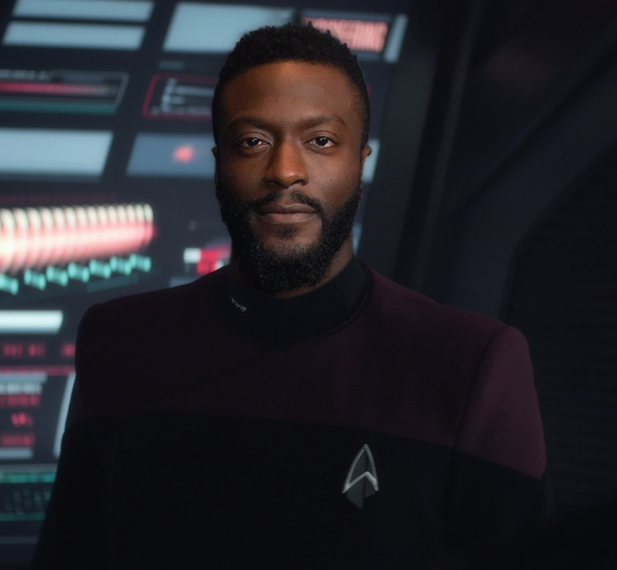The bridge of the USS Seoul buzzed with a tense energy as Commander Adeola “Deo” Johnson stood steadfastly at the center, his calm and composed demeanor a reassured presence amidst the chaos. On the main viewscreen, an Underspace tunnel, their intended shortcut through a treacherous part of the Delta Quadrant, churned with violent energy. The once-stable passage now threatened to tear apart, sending debris and destabilized ships whirling through space.
“Status report,” Deo commanded, his deep-set brown eyes narrowing with focused intensity as he scanned the turbulent scene before him.
“Commander, we’re picking up multiple distress signals from ships caught in the collapse,” reported Lieutenant R’Kala, her voice firm yet tinged with urgency. At the tactical station, her fingers danced over the controls as she analyzed the incoming data, identifying the locations and conditions of the stranded vessels.
Lieutenant Xian Li, the Chief Science Officer, leaned forward at his console, his brow furrowed in concentration as he attempted to stabilize the readings. “The tunnel’s collapse is releasing massive amounts of subspace interference, Commander. It’s destabilizing the nearby vessels’ warp cores and making precise sensor readings difficult.”
“Can we establish communications with them?” Deo inquired, his mind racing as he considered the possibilities—rescue missions, potential threats, and the impact of the Underspace collapse on nearby systems.
At the communications console, Lieutenant Jahan Maru, the fresh Communications Officer, worked rapidly, attempting to cut through the interference. “I’m patching through now, Commander,” he replied, his Bajoran earring glinting as he adjusted the frequencies. His eyes narrowed in concentration. “Subspace comms are unstable, but I’m getting snippets of distress calls. It’s chaotic out there.”
Commander T’Vaal, the Executive Officer, stood beside Deo, her Vulcan calm unshaken by the chaos unfolding. “We must prioritize the most critical distress signals,” she advised. “It is likely that we cannot save these vessels. We should focus our resources where they will have the greatest impact.”
Deo nodded, appreciating the logic in T’Vaal’s words but feeling the weight of the decisions he would soon have to make. “Lieutenant R’Kala, prepare for potential boarding actions. If there are hostile forces taking advantage of this situation, I want our security teams ready.”
“Aye, Commander,” R’Kala responded, her Klingon instincts aligning with the need for swift and decisive action. She promptly began coordinating with her team, ensuring that the USS Seoul was prepared for any threats that might arise amidst the chaos.
Meanwhile, Lieutenant Commander Nia Patel, the Chief Engineer, was already hard at work. “Commander, I’m diverting power to the structural integrity field and shields,” she called out from her station. “The tunnel’s collapse is putting an additional strain on our systems, and we need to be ready to withstand any shockwaves or debris impacts.”
“Good work, Sparks,” Deo replied, using her nickname in a moment of familiarity that grounded the crew amidst the tension. “Lieutenant Tal,” he continued, addressing the Chief Operations Officer, Arjin Tal, who was meticulously monitoring ship-wide systems. “Coordinate with Engineering to ensure power allocation remains stable. We can’t afford any fluctuations right now.”
“Acknowledged, Commander,” Tal responded, his Denobulan efficiency evident as he synchronized the ship’s systems with Patel’s adjustments, ensuring the Seoul remained fully operational.
The bridge was a flurry of focused activity, each officer playing their part in navigating the unfolding crisis. Despite the dire situation, there was a sense of confidence that radiated from their leader, guiding them through the storm.
Deo took a deep breath, his mind balancing the urgency of rescue with the strategic needs of the mission. “Set course for the nearest distress signal. Helm, take us in carefully—full impulse.”
“Aye, Commander,” replied Lieutenant Maria Espinoza, the ship’s helmsman, her hands steady as she adjusted the controls with precision. The USS Seoul surged forward, moving through the maelstrom of debris with practiced ease.
As the ship approached the first of the distressed vessels, Deo’s voice resonated across the bridge. “Let’s show them what the USS Seoul is capable of. Engage rescue operations and stay alert for any surprises. He tapped his communicator, connecting immediately to sickbay. “Sickbay, this is the bridge. Prepare to receive casualties—we may have injured crew and civilians coming aboard soon.”
In sickbay, Lieutenant Commander Shreya zh’Thrani acted quickly. “Understood, Commander. We’re ready,” she assured, already coordinating with her medical team to prepare for incoming wounded. Lieutenant Commander Shreya zh’Thrani quickly organized the medical bay, prepared every biobed, and ensured that the staff was ready to handle the situation with her Andorian efficiency.
Back on the bridge, under Commander Johnson’s leadership, the crew moved swiftly and with purpose, each member contributing their expertise to the effort. In the heart of the Delta Quadrant, far from the safety of Federation space, the USS Seoul stood as a beacon of hope and strength, ready to uphold the principles of the Federation in the face of chaos and danger.

 Bravo Fleet
Bravo Fleet








